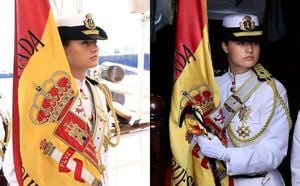Fiona Swarovski, a prominent figure in Austrian high society, recently expressed her happiness about her marriage, stating, "My fountain of youth is that I have the best man in the world. And every day when I wake up, I tell myself how happy I am." However, it seems that her joy is being tested. Her husband, Karl-Heinz Grasser, was found guilty on March 25, 2025, and sentenced to four years in prison for bribery related to the sale of state properties.
The couple's 20th wedding anniversary, which falls on October 22, 2025, is likely to be overshadowed by this legal turmoil. Since 2020, when Grasser was first convicted in a preliminary ruling, both have withdrawn from the social spotlight, avoiding events such as the Vienna Opera Ball and the Salzburg Festival.
Living in a picturesque chalet near Kitzbühel, the couple enjoyed a lavish lifestyle, often traveling to Italy for vacations, including sun-soaked summers on Ischia and shopping sprees in Milan during autumn. Fiona, who was born Fiona Winter, is no stranger to the spotlight. Her mother, Marina Giori-Lhota, is a significant shareholder in the Swarovski company, holding about 13 percent of the shares.
Fiona’s marriage history is complex; she has been married multiple times. She shares two sons, Arturo (34) and Nicholas (31), from her second marriage to Italian businessman Andrea Pacifico Griffini, and a daughter, Tayla (24), from her third marriage to John Balzarini. Her youngest daughter, Tara Gertrud (17), is from her current marriage with Grasser.
Grasser’s conviction stems from his role in the Buwog trial, where he was found guilty of breach of trust and accepting gifts during the privatization of federal housing companies in 2004. This monumental case involved nearly ten million euros in bribes, a situation described as "unprecedented" in Austria, according to the chair of the five-member judge panel at the Supreme Court.
The Supreme Court's ruling confirmed Grasser's initial conviction, but it also reduced his sentence from eight years to four years, citing the "exorbitantly long duration of the proceedings"—approximately 15 years—as a significant factor in their decision. The lengthy legal battle has raised questions about the efficiency of the Austrian judicial system, which has faced criticism over similar delays in other cases.
While Grasser maintains his innocence, claiming the verdict is "unjust" and "legally untenable," he plans to appeal to the European Court of Human Rights. However, this appeal will not delay his prison sentence.
Following the Supreme Court's decision, the Vienna Regional Criminal Court will reassess some aspects of the case. There are still unresolved charges concerning evidence falsification, which the court has referred back to the first instance for further consideration. The Economic and Corruption Prosecutor's Office (WKStA) may choose to withdraw these charges, but a decision on whether to proceed remains pending.
The implications of Grasser's conviction extend beyond personal turmoil for Fiona and their family. The case has highlighted systemic issues within the Austrian legal framework, particularly concerning prolonged legal proceedings that can hinder justice. As the WKStA deliberates on the next steps, the public awaits clarity on whether Grasser will face additional charges or if his current sentence will stand as the final word in this high-profile corruption case.
Fiona's life, once filled with glamour and social engagements, now faces uncertainty as she navigates the challenges posed by her husband's legal troubles. The couple's withdrawal from public life has been a stark contrast to their previous jet-setting lifestyle, where they were fixtures at elite events.
As they approach their anniversary, the couple’s future remains uncertain. The joy that Fiona once spoke of may be overshadowed by the reality of her husband's incarceration. The question now is whether they can weather this storm together or if the pressures of the situation will drive them apart.








